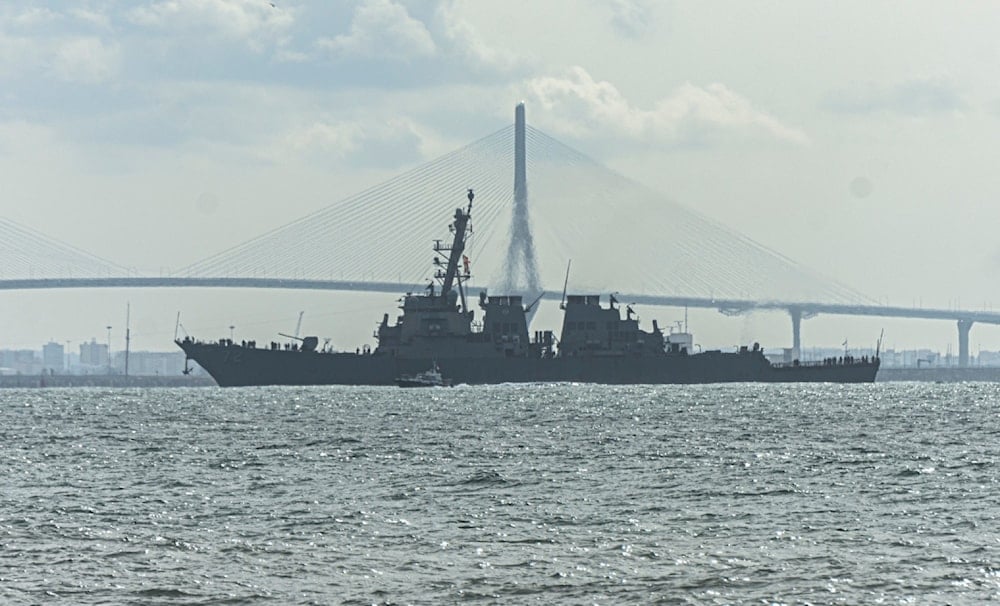US deploys additional 16,000 troops to Caribbean
The United States has expanded its Caribbean deployment to nearly 16,000 troops, reactivated a long-closed base in Puerto Rico.
-

The destroyer USS Mahan (DDG 72), part of the USS Gerald R. Ford strike group, has arrived at the Rota Naval Base for logistical support operations. This stopover prepares the vessel for its transit toward Caribbean waters (X, @AgustinLowpozi)
The United States has expanded its military presence in the Caribbean to nearly 16,000 personnel. According to The Washington Post, Pentagon data indicate that as of October 31, around 10,000 US troops and 6,000 sailors have been stationed in the region, excluding forces based in Puerto Rico.
The deployment includes eight US Navy warships and a nuclear-powered attack submarine, with the arrival of the USS Gerald R. Ford aircraft carrier expected next week. The buildup marks one of Washington's largest regional mobilizations in recent years, officially described as part of an expanded campaign against drug trafficking in the Caribbean and Latin America.
Yet the scope and scale of the operation suggest broader objectives. Bloomberg revealed that the former US Navy base at Roosevelt Roads in Ceiba, Puerto Rico, once shuttered in 2004 after years of public protests, has been reactivated as a forward-operating hub for warplanes, surveillance aircraft, and rapid troop deployments. The facility, located near the island of Vieques, a site historically devastated by USbombing exercises, is now hosting F-35B fighter jets, Ospreys, and C-17 Globemasters.
Army veteran and local resident Monisha Ríos, whose home overlooks the base, called the move "a provocation", noting that "we're murdering people in international waters," in reference to US strikes on boats allegedly linked to drug smuggling. According to regional media, at least 14 such attacks since September have killed more than 60 people, mostly Venezuelans, Colombians, and Trinidadians, without trial or investigation.
Regional alert amid US maneuvers
The militarization has already triggered defensive measures across the Caribbean. On Friday, The Trinidad Express reported that the country's armed forces were placed on their highest state of alert, ordering all personnel to return to bases immediately amid fears that the United States may be preparing airstrikes against Venezuela. Senior officers convened an emergency meeting and declared State One, the highest operational readiness level.
The alert followed reports in Western media suggesting that Washington was on the verge of striking Venezuelan military sites. The Miami Herald cited unnamed sources claiming that such attacks could begin "in a matter of days or even hours," placing the USS Iwo Jima assault ship and its escorting vessels roughly 200 kilometers from Venezuela's La Orchila Island, well within operational range of the country's coastline.
US Secretary of State Marco Rubio dismissed those claims, writing on X: "Your ‘sources' claiming to have ‘knowledge of the situation' tricked you into writing a fake story." But his denial did little to calm regional unease.
Caribbean divisions and Venezuelan response
Observers across Latin America argue that the "war-on-drugs" justification serves as a pretext for renewed US militarization and possible regime-change operations against Venezuela and Colombia. Caracas has condemned the buildup as an act of aggression disguised as counter-narcotics enforcement, warning that any direct attack would be met with "a proportional response." President Nicolás Maduro has accused Washington of waging a covert war to overthrow his government and seize Venezuela's oil wealth.
"Everything being done against Venezuela is designed to justify war, overthrow the government, and seize our oil resources," Maduro declared on Friday, adding, "We will not submit."
While Washington's allies such as Trinidad and Grenada have offered limited logistical cooperation, 14 CARICOM member states reaffirmed their commitment to maintaining the Caribbean as a "zone of peace," urging that all security matters be addressed within international law. Puerto Rico, as a US territory, was not a signatory to that declaration.
A broader campaign under the ‘drug war' banner
The current buildup follows remarks by White House Press Secretary Karoline Leavitt on August 19, when she stated that President Donald Trump was prepared to use "every element of American power" to confront drug trafficking. Her comments came after reports that more than 4,000 Marines and sailors were being dispatched to the region to reinforce operations against so-called "narco-terrorist networks."
Since then, the United States has tightened flight restrictions off Puerto Rico under Pentagon orders and moved carrier strike groups under the US Southern Command's authority. Analysts warn that the combination of revived military bases, expanded naval presence, and provocative rhetoric points to a de facto militarization of the Caribbean, a development viewed across the region as a direct threat to sovereignty and peace.
Read more: Venezuela thanks Russia for support, reaffirms strategic partnership

 4 Min Read
4 Min Read








